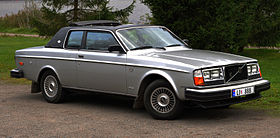Motor vehicle
| Volvo 262C | |
|---|---|
 1978 Volvo 262C Bertone (with US-spec headlights) 1978 Volvo 262C Bertone (with US-spec headlights) | |
| Overview | |
| Manufacturer | Volvo / Bertone |
| Also called | Volvo Coupé |
| Production | 1977–1981 (6,622 built) |
| Model years | 1978–1981 |
| Assembly | Italy: Turin (Gruppo Bertone) |
| Designer | Jan Wilsgaard |
| Body and chassis | |
| Class | |
| Body style | 2-door coupé |
| Layout | FR layout |
| Related | Volvo 260 series |
| Powertrain | |
| Engine |
|
| Transmission |
|
| Dimensions | |
| Wheelbase | 2,640 mm (103.9 in) |
| Length | 4,890 mm (192.5 in) |
| Width | 1,710 mm (67.3 in) |
| Height | 1,440 mm (56.7 in) |
| Curb weight | 1,425–1,440 kg (3,141.6–3,174.7 lb) |
| Chronology | |
| Successor | Volvo 780 |
The Volvo 262C is a luxury coupé made by Volvo from 1977 (as 1978 model) to 1981. Based on the 264 six-cylinder saloon, the 262C was designed in-house by Volvo's Jan Wilsgaard, and built mainly by Bertone in Turin, Italy.
Concept and design
The drivetrain, suspension, floor pan, and many of the body panels of the 262C were taken directly from the Volvo 260 four-door sedan, with Bertone building the roof pillars, roof pan, windshield surround, cowl, and upper parts of the doors. The roof of the 262C is about 100 mm (3.9 in) lower than that of the 260 sedans. The chopping had the effect of cramping interior space, and the wide C-pillars made for small-sized rear side windows.

The 262C used the PRV engine, a V6 engine developed jointly by Peugeot, Renault, and Volvo. The engine used a Lambda-sond oxygen sensor system; this was the first use of this system on a production V engine.
Standard equipment included power windows and mirrors, central locking, cruise control, air conditioning, heated front seats, leather interior, alloy wheels, and electrically powered radio antenna. The only optional extras were a limited-slip differential, a choice of stereos, and the no-cost option of a Borg-Warner three-speed automatic instead of the four-speed manual with electrically operated overdrive. By 1981, the manual-transmission option had been discontinued for the U.S. market.
Convertible

On the occasion of Volvo's 25th anniversary in the United States, Volvo North America contracted Newport Conversions of Santa Ana, California, to convert the 262C into a convertible to give as a gift to the company CEO. This version was called the 262C Solaire. Volvo's Swedish headquarters, however, vetoed the project due to safety concerns. A total of five 262 convertibles were made.
Reception
Aimed mainly at the United States market, the 262C was Volvo's first entry into the luxury car segment. About half of the annual production was earmarked for the United States. It competed against the Cadillac Eldorado and the Mercedes-Benz 280 CE and 300 CD. A total of 6,622 cars were produced from 1978 until 1980. The model was available in only one color combination: silver paint with black vinyl-covered roof. One automobile journalist described the 262C as "the strangely proportioned two-door looks like a chopped diesel locomotive" that "evades the classic ideals of beauty, regardless of the stylistic authorship."
Annual changes

For the 1979 model year, the rear-end design was modified with a deeper trunk lid and wrap-around taillights. Upgrades included thermostatic heater controls, and cars with manual transmission included the shift linkage from the 242GT.
The 1980 model year featured an engine displacement increase from 2,664 to 2,849 cc (162.6 to 173.9 cu in) as a result of the bore going from 88 to 91 mm (3.46 to 3.58 in). The engine was also reconfigured, with seven main bearings instead of four and an increase in compression ratio from 8.2:1 to 8.8:1. Also, in 1980, the front air dam from the 242GT was added to the 262C. For North America, the 2.8-litre engine was rated at 130 hp (97 kW).
The vinyl roof cover was deleted for the final 1981 model year of production.
References
- "Volvo 262c" (PDF). Volvo Car Club. Retrieved 6 May 2024.
- ^ McCourt, Mark J. (23 September 2018). "Volvo 262C Bertone Coupe". Hemmings Motor News. Retrieved 6 May 2024.
- ^ Puthz, Martin (28 September 2020). "Cut-price cruise liners: Volvo 262 C and 780 Bertone". Classic & Sports Car. Retrieved 3 August 2022.
- Hartford, Bill (February 1978). "Imports & Motorsports". Popular Mechanics: 42.
- ^ Hogg, Tony (ed.). "1981 Buyer's Guide". Road & Track's Road Test Annual & Buyer's Guide 1981 (January-February 1981): 127.
- Nyblad, Fredrik (15 July 2019). "Volvo 262C Solaire – med himlen som tak!" [Volvo 262C Solaire - with the skies for a roof!]. klassiker.nu (in Swedish).
| « previous — Volvo Cars road car timeline, 1975–2019 — next » | |||||||||||||||||||||||||||||||||||||||||||||||||||||||||||||||||||||||||||||||||||||||||||||||||||||||||||||||||||||||||||||||||||||||||||||||||||||||||||||||||||||||||||||||||||||||||||||||||||||||||||||||||||||||||||||||||||||||||||||||||||||||||||||||||||||||||||||||||||||||||||||||||||||||||||||||||||||||||||||||||||||||||||||||||||||||||||||||||||||||||||||||||||||||||||||||||||||||||||||||||||||||||||||||||||||||||||||||||||||||||||||||||||||||||||||||||||||||||||||||||||||||||||||||||||||||||||||||||||||||||||||||||||||||||||||||||||||||||||||||||||||||||||||||||||||||||||||||||||||||||||||||||||||||||||||||||||||||||||||||||||||||||||||||||||||||||||||||||||||||||||||||||||||||||||||||||||||||||||||||||||||||||||||||||||||||||||||||||||||||||||||||||||||||||||||||||||||||||||||||||||||||||||||||||||||||||||||||||||
|---|---|---|---|---|---|---|---|---|---|---|---|---|---|---|---|---|---|---|---|---|---|---|---|---|---|---|---|---|---|---|---|---|---|---|---|---|---|---|---|---|---|---|---|---|---|---|---|---|---|---|---|---|---|---|---|---|---|---|---|---|---|---|---|---|---|---|---|---|---|---|---|---|---|---|---|---|---|---|---|---|---|---|---|---|---|---|---|---|---|---|---|---|---|---|---|---|---|---|---|---|---|---|---|---|---|---|---|---|---|---|---|---|---|---|---|---|---|---|---|---|---|---|---|---|---|---|---|---|---|---|---|---|---|---|---|---|---|---|---|---|---|---|---|---|---|---|---|---|---|---|---|---|---|---|---|---|---|---|---|---|---|---|---|---|---|---|---|---|---|---|---|---|---|---|---|---|---|---|---|---|---|---|---|---|---|---|---|---|---|---|---|---|---|---|---|---|---|---|---|---|---|---|---|---|---|---|---|---|---|---|---|---|---|---|---|---|---|---|---|---|---|---|---|---|---|---|---|---|---|---|---|---|---|---|---|---|---|---|---|---|---|---|---|---|---|---|---|---|---|---|---|---|---|---|---|---|---|---|---|---|---|---|---|---|---|---|---|---|---|---|---|---|---|---|---|---|---|---|---|---|---|---|---|---|---|---|---|---|---|---|---|---|---|---|---|---|---|---|---|---|---|---|---|---|---|---|---|---|---|---|---|---|---|---|---|---|---|---|---|---|---|---|---|---|---|---|---|---|---|---|---|---|---|---|---|---|---|---|---|---|---|---|---|---|---|---|---|---|---|---|---|---|---|---|---|---|---|---|---|---|---|---|---|---|---|---|---|---|---|---|---|---|---|---|---|---|---|---|---|---|---|---|---|---|---|---|---|---|---|---|---|---|---|---|---|---|---|---|---|---|---|---|---|---|---|---|---|---|---|---|---|---|---|---|---|---|---|---|---|---|---|---|---|---|---|---|---|---|---|---|---|---|---|---|---|---|---|---|---|---|---|---|---|---|---|---|---|---|---|---|---|---|---|---|---|---|---|---|---|---|---|---|---|---|---|---|---|---|---|---|---|---|---|---|---|---|---|---|---|---|---|---|---|---|---|---|---|---|---|---|---|---|---|---|---|---|---|---|---|---|---|---|---|---|---|---|---|---|---|---|---|---|---|---|---|---|---|---|---|---|---|---|---|---|---|---|---|---|---|---|---|---|---|---|---|---|---|---|---|---|---|---|---|---|---|---|---|---|---|---|---|---|---|---|---|---|---|---|---|---|---|---|---|---|---|---|---|---|---|---|---|---|---|---|---|---|---|---|---|---|---|---|---|---|---|---|---|---|---|---|---|---|---|---|---|---|---|---|---|---|---|---|---|---|---|---|---|---|---|---|---|---|---|---|---|---|---|---|---|---|---|---|---|---|---|---|---|---|---|---|---|---|---|---|---|---|---|---|---|---|---|---|---|---|---|---|---|---|---|---|---|---|---|---|---|---|---|---|---|---|---|---|---|---|---|---|---|---|---|---|---|---|---|---|---|---|---|---|---|---|---|---|---|---|---|---|---|---|---|---|---|---|---|---|---|---|---|---|---|---|---|---|---|---|---|---|---|---|---|---|---|---|---|---|---|---|---|---|---|---|---|---|---|---|---|---|---|---|---|---|---|---|---|---|---|---|---|---|---|---|---|---|---|---|---|---|---|---|---|---|---|---|---|---|---|---|---|---|---|---|---|---|---|---|---|---|---|---|---|---|---|---|---|---|---|---|---|---|---|---|---|---|---|---|---|---|---|---|---|---|---|---|---|---|---|---|---|---|---|---|---|---|---|---|---|---|---|---|---|---|---|---|---|---|---|---|---|---|---|---|---|---|---|---|---|---|---|---|---|---|---|---|---|---|---|
| |||||||||||||||||||||||||||||||||||||||||||||||||||||||||||||||||||||||||||||||||||||||||||||||||||||||||||||||||||||||||||||||||||||||||||||||||||||||||||||||||||||||||||||||||||||||||||||||||||||||||||||||||||||||||||||||||||||||||||||||||||||||||||||||||||||||||||||||||||||||||||||||||||||||||||||||||||||||||||||||||||||||||||||||||||||||||||||||||||||||||||||||||||||||||||||||||||||||||||||||||||||||||||||||||||||||||||||||||||||||||||||||||||||||||||||||||||||||||||||||||||||||||||||||||||||||||||||||||||||||||||||||||||||||||||||||||||||||||||||||||||||||||||||||||||||||||||||||||||||||||||||||||||||||||||||||||||||||||||||||||||||||||||||||||||||||||||||||||||||||||||||||||||||||||||||||||||||||||||||||||||||||||||||||||||||||||||||||||||||||||||||||||||||||||||||||||||||||||||||||||||||||||||||||||||||||||||||||||||